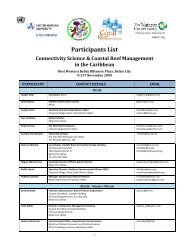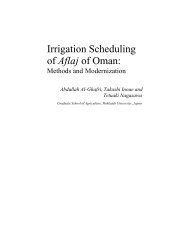The Global Water Crisis: Addressing an Urgent Security - Unu-inweh ...
The Global Water Crisis: Addressing an Urgent Security - Unu-inweh ...
The Global Water Crisis: Addressing an Urgent Security - Unu-inweh ...
You also want an ePaper? Increase the reach of your titles
YUMPU automatically turns print PDFs into web optimized ePapers that Google loves.
Following on this, during a personal conversation between the author of this paper (Dr. Walid Saleh) <strong>an</strong>d Dr. Sally Toma,<br />
member of the executive Egypti<strong>an</strong> Revolution Youth Council, she stated that “45 [members] of the Revelation Youth<br />
Council visited Ethiopia to discuss the Nile water issue <strong>an</strong>d were informed by Ethiopi<strong>an</strong> government officials that they will<br />
not act unilaterally until a proper government is installed in Egypt” (Toma, 2012). She went on to say that the Ethiopi<strong>an</strong><br />
Government officials revealed to the Egypti<strong>an</strong> delegates that the problems with the previous regime in Egypt stemmed<br />
from the authoritari<strong>an</strong> attitude <strong>an</strong>d the l<strong>an</strong>guage of power <strong>an</strong>d threats. <strong>The</strong>y indicated that these were major obstacles<br />
to reaching <strong>an</strong> agreement over the sharing of the Nile waters. <strong>The</strong> recent creation of South Sud<strong>an</strong> has now added to<br />
the complexity of the situation. <strong>The</strong>refore, there is <strong>an</strong> urgent need for a regional vision to avert <strong>an</strong>y future conflicts in<br />
the region. It must be stressed that all countries in the Nile River basin have shown restraint <strong>an</strong>d acted in a responsible<br />
m<strong>an</strong>ner during a very difficult tr<strong>an</strong>sition period during the post-colonial era.<br />
4.2. <strong>The</strong> Jord<strong>an</strong> River basin <strong>an</strong>d Palestini<strong>an</strong> aquifers: Towards equity of access <strong>an</strong>d allocation<br />
In addressing potential solutions for chronic issues over Middle Eastern waters, one might be inclined to think that the<br />
problems might be solved through regional cooperation or by applying modern m<strong>an</strong>agement approaches. However, the<br />
water problems that exist in the Middle East are not just water scarcity problems, but are political issues that have been<br />
<strong>an</strong>d continue to be used as strategic weapons. This is true in the case of the water conflicts between Israel <strong>an</strong>d Palestine,<br />
<strong>an</strong>d Israel <strong>an</strong>d Jord<strong>an</strong>, Syria, <strong>an</strong>d Leb<strong>an</strong>on, respectively. Since the establishment of Israel in 1948, there has been conflict<br />
over the Jord<strong>an</strong> River basin. In fact, the 1967 Arab-Israeli war was fought not only over territories, but also over the control<br />
of water bodies of the River Jord<strong>an</strong> <strong>an</strong>d its tributaries. When the Gol<strong>an</strong> Heights were seized by Israel, all the headwaters<br />
of the Jord<strong>an</strong> River <strong>an</strong>d a large stretch of the Yarmouk River consequently came under its control. <strong>The</strong> occupation of<br />
the West B<strong>an</strong>k also gave control of the lower Jord<strong>an</strong> River basin to Israel. <strong>The</strong> 1982 Israeli invasion of Leb<strong>an</strong>on <strong>an</strong>d the<br />
creation of the ‘security zone’ in the south gave Israel greater control of the Jord<strong>an</strong> <strong>an</strong>d Lit<strong>an</strong>i rivers. <strong>The</strong> disagreement<br />
over water has been a serious stumbling block in the present ongoing negotiations between Israel <strong>an</strong>d Syria, <strong>an</strong>d Israel <strong>an</strong>d<br />
the Palestini<strong>an</strong>s. <strong>The</strong> Israeli failure to honour a water sharing agreement with Jord<strong>an</strong> has also been a source of tension.<br />
Furthermore, the Israeli mining of the underground Palestini<strong>an</strong> aquifers <strong>an</strong>d the denial to the Palestini<strong>an</strong>s of this water<br />
c<strong>an</strong> be seen as a war tactic used by the Israeli to drive the Palestini<strong>an</strong>s out of their l<strong>an</strong>d. In addition to the mining of the<br />
waters, the Israeli are directly polluting the underground waters under Palestini<strong>an</strong> control by releasing raw wastewater<br />
from the illegally-built settlements in the West B<strong>an</strong>k (Lendm<strong>an</strong>, 2009). In fact, Israeli scientists have recently warned that<br />
polluting Palestini<strong>an</strong> groundwater will not only directly destroy the aquifers under Palestini<strong>an</strong> control, but that it will also<br />
eventually pollute the Palestini<strong>an</strong> aquifers under Israeli control. Israeli scientists are calling upon their government to stop<br />
these immoral, illegal, <strong>an</strong>d inhum<strong>an</strong> practices.<br />
A recent report from the French Parliament’s Foreign Affairs Committee entitled <strong>The</strong> Geopolitics of <strong>Water</strong>, concluding<br />
on the work of a fact-finding mission from October 2010, accused Israel of implementing “apartheid” policies in its<br />
allocation of water resources in the West B<strong>an</strong>k (Glav<strong>an</strong>y, 2010: 19). Glav<strong>an</strong>y asserts that water has become “a weapon<br />
serving the new apartheid” (Glav<strong>an</strong>y, 2010: 19), with examples <strong>an</strong>d statistics to back up these claims. <strong>The</strong> report states<br />
that “[s]ome 450,000 Israeli settlers on the West B<strong>an</strong>k use more water th<strong>an</strong> the 2.3 million Palestini<strong>an</strong>s that live there”<br />
<strong>an</strong>d “[i]n times of drought, in contravention of international law, the settlers get priority for water” (Glav<strong>an</strong>y, 2010: 19).<br />
Through these examples, the report highlights the unfair allocation of water to West B<strong>an</strong>k Palestini<strong>an</strong>s <strong>an</strong>d the fact that<br />
Palestini<strong>an</strong>s have no access to the territory’s underground aquifers (Glav<strong>an</strong>y, 2010). Glav<strong>an</strong>y further states that “Israel’s<br />
territorial exp<strong>an</strong>sion is seen as a ‘water occupation’ of both streams <strong>an</strong>d aquifers [...] the separation wall being built by<br />
Israel allows it to control access to underground water sources… [<strong>an</strong>d to] direct the flow of water westward” (Glav<strong>an</strong>y,<br />
2010: 17-20). <strong>The</strong> findings from the Glav<strong>an</strong>y report underline the need for the attainment of equity <strong>an</strong>d justice in terms<br />
of water access <strong>an</strong>d allocation as paramount to resolving this ongoing conflict. Without equitable <strong>an</strong>d just allocation of<br />
water resources, there c<strong>an</strong> be no real conflict resolution.<br />
4.3. <strong>The</strong> Euphrates <strong>an</strong>d Tigris river basins<br />
Syria <strong>an</strong>d Iraq, as the downstream countries of the Euphrates River, are affected by the construction of the Turkish GAP<br />
project. It is estimated that because of the GAP project, Syria <strong>an</strong>d Iraq have seen 40% <strong>an</strong>d 80% reduction, respectively, of<br />
their equitable shares of the river water. <strong>The</strong> impacts are already strongly felt by the Iraqis <strong>an</strong>d have had drastic effects<br />
on the country’s food security, demonstrated by the fact that m<strong>an</strong>y farmers have ab<strong>an</strong>doned their farms. In addition,<br />
<strong>Water</strong> <strong>an</strong>d Political <strong>Security</strong>: Conflict in West Asia <strong>an</strong>d North Africa<br />
Part 1<br />
51




